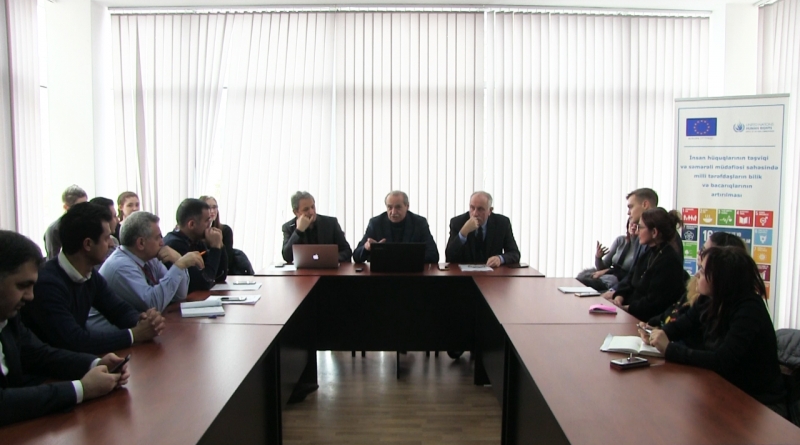
Baku / 14.02.20 / Turan: On 14 February, the Baku Press Club held a roundtable on the theme “Parliamentary Elections 2020 and the Media: Rights and Obligations of a Journalist”.
The topic of discussion was the results of monitoring the media covering the February 9 elections and the protection of the rights of journalists.
The elections were held in the conditions of the information blockade of the elections at all stages, including the registration of candidates, the election campaign and election day.
On January 29, the OSCE / ODIHR Election Observation Mission noted in an interim report restrictions on media access to the elections.
Director of Turan agency Mehman Aliyev indicated that traditional media (television, radio, print media, and online media) were at the end of the election coverage process and could not influence their course. There were two reasons: firstly, the authorities, controlling more than 90% of the traditional information space, pursue a policy of minimizing the coverage of elections at all stages in order to weaken the public’s attention to the elections and facilitate the falsification process and achieve the formation of a pro-government parliament.
Secondly, the same decision was echoed by a boomerang: the neutralized media could not form the picture of “democratic and fair elections” that the authorities needed. Media expert Alesker Mammadli voiced the report of the Institute for Democratic Initiatives (IDN) media monitoring at the first stage of the election campaign. The objects of research were AzTV, OTV and Real TV channels, the state news agency Azərtac (www.azertag.az), the official newspaper Azerbaijan, the agencies Report, Turan, the online publication Meydan TV, and the newspaper Azadlig.
On TV channels, monitoring covered “prime-time” (from 19.00 to 23.00) for 4 hours daily for 37 days. Absolute prevalence of information in favor of the authorities, lack of criticism and positive information about the opposition were revealed. Non-compliance with such universal principles as objectivity, impartiality, impartiality, pluralism is also revealed. Monitoring found that television channels are far from the functions that broadcasters perform in a democratic society. Among the ethical observers, Turan and Meydan.Tv were named.

Mehman Aliyev indicated that the CEC information center was engaged in misinforming the public about the progress and results of the findings, which were replicated by controlled media. The so-called three-stage monitoring of the Press Council was not about anything, and did not reveal those violations that became widely known to the public through social networks.
A distinctive feature of the current election, Aliyev noted, is the control over the situation of social networks, which played an important role, and especially on election day. Thanks to them, all the flaws of the electoral system are revealed - lobbying, falsifications, violence against observers and journalists. Thanks to social networks, the results in several districts were canceled.
Khalid Agaliyev, a representative of the Institute of Media Rights, noted that during the dispersal of the picket by the police in front of the CEC building of the protesting candidates, 17 journalists and bloggers were injured, which was the culmination of a violation of the rights of journalists during the election.
Mehman Aliyev voiced a number of recommendations that could change the information problem of the elections in the future:
1. Expand campaigning for up to 60 days,
2. Create a special TV at the CEC, which will broadcast during the election period and on a free basis, represent candidates' introductions, hold discussions, etc.,
3. Promote the role of social networks for campaigning and election control.
4. To create mechanisms that exclude information manipulation of the CEC.
According to the results of the roundtable, the head of the Baku Press Club Arif Aliyev read out an appeal in which he noted: “Monitoring of media coverage of the early parliamentary elections showed the journalistic crisis in the country. The media did not cope with such important tasks as informing, educating the population, creating the conditions for debate, and pluralism of the political campaign. Television deliberately refused to fulfill these responsibilities. ”
During the election process, journalists were physically abused while carrying out their professional activities. Several people were seriously injured when dispersing the picket in front of the CEC, which had serious consequences. Instead of investigating the fact, the authorities decided to discredit the journalists. The country did not have a single journalistic organization capable of defending their rights, the document says.
The appeal notes, “Appropriate steps must be taken to increase the role of the media in their implementation, and important work must be done to train journalists, restore media independence and protect the rights of journalists”.
Baku Press Club invites the journalistic community and the highest authorities of the country to join forces in this direction and start a dialogue for effective actions to eliminate media problems.
The Baku Press Club was established in 1998, but ceased operations in 2005 as a result of pressure from the authorities on the media. The activity was resumed in the summer of 2019 by the decision of the co-founders: the journalistic association Yeni Nesil, the newspaper Aina-Zerkalo, Turan News Agency.-0-















Leave a review